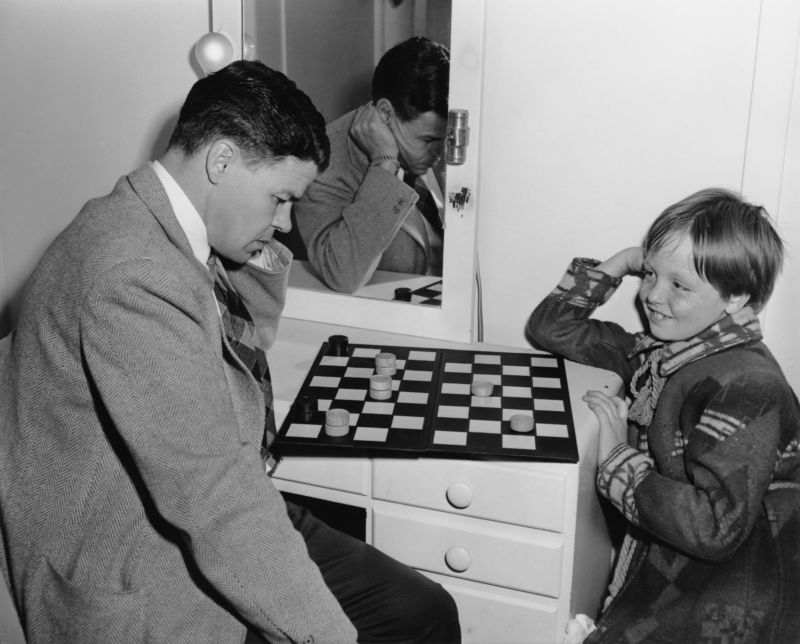Things Are Either Too Challenging or Too Easy
Is your PS4 gathering dust, too? —
Tales of an aging gamer: Why don't I pick up a controller as often as I used to?
We keep getting older, the games stay the same (and science backs that up).

Enlarge / Gaming, circa 1946, may have been easier for older players when compared to present-day rounds of Fortnite.
Getty Images / Archive Images
Despite a wider variety than ever before, video games don't have the same effect on me as they used to. That might not sound like a problem to some of you, but it is to me. I have played video games from the early days of my childhood, starting somewhere around the late '80s. I became heavily addicted to my Game Boy as a kid, and I can still remember the thrill I felt the day I bought my first PlayStation 22 years ago.
Gaming was like breathing. It was the biggest part of my life as a teenager, one of my priorities as a college student, and eventually one of my most expensive "hobbies" as a young professional.
Then all of a sudden, after thousands of hours spent playing across genres and platforms, boredom hit me hard for the very first time in my early thirties. Some of my favorite games soon gave me the impression of being terribly long. I couldn't help but notice all the repeating tropes and similarities in game design between franchises.
I figured it was just a matter of time before I found the right game to stimulate my interest again, but time continued to go by and nothing changed.
My 41-year-old cousin had dealt with the same thing years before me, and he had a simple explanation: "Now it's you who has to worry about rent and bills, not your dad." Deep inside I knew he was right. The more responsibilities, problems, and stress in life, the more we lose our appetite for things that used to entertain us, gaming included. But could there be something more to it than that? Games themselves were also changing. As technology enabled things I wouldn't have dreamed were possible as a kid, it created entirely new platforms for gaming.
On top of that, as people grow older there are inevitable changes that influence how we see games—including things as simple as needing glasses to actually play the game. The gradual loss of focusing ability for near vision as we age, known as presbyopia, makes gaming on smartphones and portable game consoles a nightmare for older people. Happenings like this help explain why devices such as PS Vitas are created almost exclusively for younger players.
So, are the changes I've been experiencing some kind of fluke or an inevitable process for many? Can you in essence age out of gaming?

Enlarge / The blog for this study is some interesting reading.
A normal (gamer) aging process
I'm far from the only former gamer thinking about this reality—there have been several good scientific studies on the matter within the last decade, in fact. One in particular seemed to answer all my initial questions. Collecting information from a staggering 239,000 gamers in recent years, market research company Quantic Foundry has been closely examining how gaming motivations and preferences change with age via its Gamer Motivation Profile.
The research suggests that many things occur as we age, all pushing people a bit further away from gaming. It's not that we wake up one morning thinking video games are boring all of sudden, but instead everything happens slowly throughout a lengthy process that most of us don't even realize. Generally, QF found that the older a gamer gets, the less eager they become in terms of gaming—respondents were less likely to label gaming as "very important/enjoyable," and their preferences shifted toward specific gaming experiences (less social and more solo gaming, for instance) not as popular among younger gamers.
While this could be due solely to a decline in enthusiasm for some, an alternative explanation is that many older gamers—especially when they have longterm partners, become parents, or ascend into highly demanding professional positions—simply have different priorities and less time for gameplay. And when you have plenty of other things to do, it's easy to avoid activities that appear to be either too easy and thus boring, or too difficult and thus frustrating.
Beyond a simple matter of time, gaming doesn't necessarily provide a sense of accomplishment, either. There is a general lack of reward when it comes to gaming—at least in terms of how adults interpret the concept of reward. The repetition of an activity that doesn't produce a visible benefit can decrease the feeling of novelty, and that's when boredom may strike. Breaking virtual records and topping the scoreboards may be bigger goals for a teenager, but for a young professional in their early thirties, something with a concrete output—think cooking, painting, gardening, or bodybuilding—may appear to be much more rewarding. Studies (like another good one from Florida State researchers in 2014) back this up, showing that certain adults simply don't view gaming as a productive activity on which to spend their free time. Many people in their thirties and forties may get more out of a dance or yoga class instead.
Source: https://arstechnica.com/gaming/2019/01/tales-of-an-aging-gamer-why-dont-i-pick-up-a-controller-as-often-as-i-used-to/
0 Response to "Things Are Either Too Challenging or Too Easy"
Post a Comment